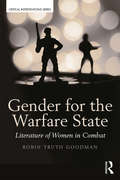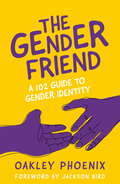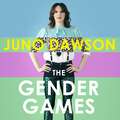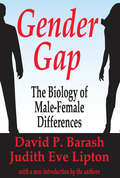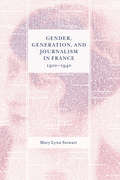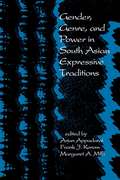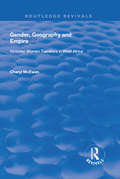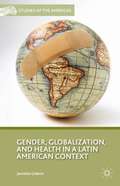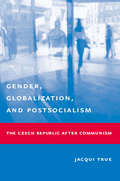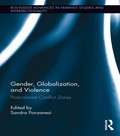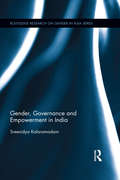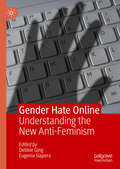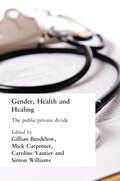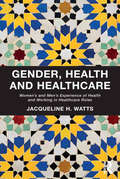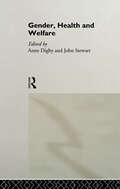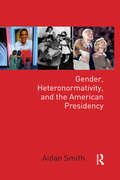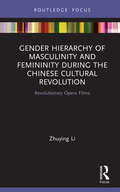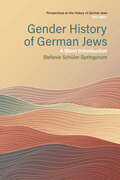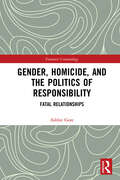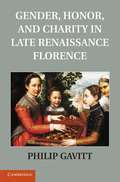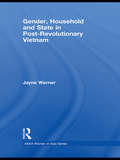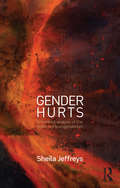- Table View
- List View
Gender for the Warfare State: Literature of Women in Combat (Critical Interventions)
by Robin Truth GoodmanGender for the Warfare State is the first scholarly investigation into the written works of U.S. women combat veterans in twenty-first century wars. Most recent studies quantify military participation, showing how many women participate in armed services and what their experiences are in a traditionally “male institution.” Many of these treatments regard women as victims solely of enemy fire, even as they are also often victims of their own military apparatus and of their own involvement in global aggression. By applying literary analysis to a sociological question, Gender for the Warfare State views women’s experiences through story and literary traditions that carry meaning into present practices. Goodman shows that women in combat are not just entering and being victimized in “male institutions,” but are also actively changing the story of gender and thus the structure of power that is constructed through gender. Moreover, this book unveils a new narrative of care that affects economic relations more broadly and the contemporary politics of the liberal social contract. Women’s participation in combat is not just a U.S. event but global and therefore has a deeper historical range than current sociological accounts imply. The book compares the political contexts of women’s entry into war now with their prior, twentieth-century contributions to wars in other cultural settings and then uses this comparison to show a variety of meanings at play in the gender of war.
The Gender Friend: A 102 Guide to Gender Identity
by Oakley PhoenixIf you lifted this book from the shelf, you're probably interested in learning more about gender. You could be in the earliest stages of questioning, newly out, well into your transition, or an ally hoping to receive some extra tips and tricks. No matter your starting point, you're in the right place. Moving beyond pronouns, the basics of social and physical transition and how to be a good ally, this definitive guide explores the ins and outs of gender - from affirming language, how to explore and question gender, coming out to parents, finding gender euphoria, supporting loved ones and yourself, and advice on what not to say - to help you understand the nuances of gender and the lived realities of trans people. With self-reflective exercises, personal anecdotes and example scenarios, this book will teach you the secrets to becoming the best gender ally you can be.Written by a young black queer trans adult, this empowering and contemporary guide is your 'gender friend' who is ready to actively listen, advise you as needed, and provide you with support as you grow as an ally, or approach the next steps in your own unique gender journey. Welcome to the gender book you've been waiting for.
The Gender Games: The Problem With Men and Women, From Someone Who Has Been Both
by Juno Dawson***WINNER OF THE UK BLACK PRIDE LITERARY PRIZE FOR NON-FICTION DIVA AWARDS 2017*** & AS SEEN ON TRANSFORMATION STREET ***'Opens minds, breaks down myths and vaporises prejudice - I loved it!' Rebecca Root, star of Boy Meets Girl 'funny, thoughtful and honest ... I read most of it on the train and had to stifle laughs every few pages' Stylist'It's a boy!' or 'It's a girl!' are the first words almost all of us hear when we enter the world. Before our names, before we have likes and dislikes - before we, or anyone else, has any idea who we are. And two years ago, as Juno Dawson went to tell her mother she was (and actually, always had been) a woman, she started to realise just how wrong we've been getting it.Gender isn't just screwing over trans people, it's messing with everyone. From little girls who think they can't be doctors to teenagers who come to expect street harassment. From exclusionist feminists to 'alt-right' young men. From men who can't cry to the women who think they shouldn't. As her body gets in line with her mind, Juno tells not only her own story, but the story of everyone who is shaped by society's expectations of gender - and what we can do about it. Featuring insights from well-known gender, feminist and trans activists including Rebecca Root, Laura Bates, Gemma Cairney, Anthony Anaxagorou, Hannah Witton, Alaska Thunderfuck and many more, The Gender Games is a frank, witty and powerful manifesto for a world in which everyone can truly be themselves.
The Gender Games: The Problem With Men and Women, From Someone Who Has Been Both
by Juno Dawson*WINNER OF THE UK BLACK PRIDE LITERARY PRIZE FOR NON-FICTION DIVA AWARDS 2017**AS SEEN ON TRANSFORMATION STREET* 'Opens minds, breaks down myths and vaporises prejudice - I loved it!' Rebecca Root, star of Boy Meets Girl 'Funny, thoughtful and honest' Stylist'It's a boy!' or 'It's a girl!' are the first words almost all of us hear when we enter the world. Before our names, before we have likes and dislikes - before we, or anyone else, has any idea who we are. And two years ago, as Juno Dawson went to tell her mother she was (and actually, always had been) a woman, she started to realise just how wrong we've been getting it.Gender isn't just screwing over trans people, it's messing with everyone. From little girls who think they can't be doctors to teenagers who come to expect street harassment. From exclusionist feminists to 'alt-right' young men. From men who can't cry to the women who think they shouldn't. As her body gets in line with her mind, Juno tells not only her own story, but the story of everyone who is shaped by society's expectations of gender - and what we can do about it. Featuring insights from well-known gender, feminist and trans activists including Rebecca Root, Laura Bates, Gemma Cairney, Anthony Anaxagorou, Hannah Witton, Alaska Thunderfuck and many more, The Gender Games is a frank, witty and powerful manifesto for a world in which everyone can truly be themselves.The Gender Games has been optioned by SunnyMarch Productions to be turned into an original television series, written by Rose Lewenstein.
The Gender Games: The Problem With Men and Women, From Someone Who Has Been Both
by Juno Dawson*SOON TO BE AN ORIGINAL TV SERIES**WINNER OF THE UK BLACK PRIDE LITERARY PRIZE FOR NON-FICTION DIVA AWARDS 2017**AS SEEN ON TRANSFORMATION STREET* 'Opens minds, breaks down myths and vaporises prejudice - I loved it!' Rebecca Root, star of Boy Meets Girl 'funny, thoughtful and honest ... I read most of it on the train and had to stifle laughs every few pages' Stylist'It's a boy!' or 'It's a girl!' are the first words almost all of us hear when we enter the world. Before our names, before we have likes and dislikes - before we, or anyone else, has any idea who we are. And two years ago, as Juno Dawson went to tell her mother she was (and actually, always had been) a woman, she started to realise just how wrong we've been getting it.Gender isn't just screwing over trans people, it's messing with everyone. From little girls who think they can't be doctors to teenagers who come to expect street harassment. From exclusionist feminists to 'alt-right' young men. From men who can't cry to the women who think they shouldn't. As her body gets in line with her mind, Juno tells not only her own story, but the story of everyone who is shaped by society's expectations of gender - and what we can do about it. Featuring insights from well-known gender, feminist and trans activists including Rebecca Root, Laura Bates, Gemma Cairney, Anthony Anaxagorou, Hannah Witton, Alaska Thunderfuck and many more, The Gender Games is a frank, witty and powerful manifesto for a world in which everyone can truly be themselves.The Gender Games has been optioned by SunnyMarch Productions to be turned into an original television series, written by Rose Lewenstein.
Gender Gap: How Genes and Gender Influence Our Relationships
by David P. Barash Judith Eve LiptonLet's face it, say Barash and Lipton: Males and females, boys and girls, men and women are different. To be sure, these differences are often heightened by distinctions in learning, cultural tradition, and social expectation, but underpinning them all is a fundamental difference that derives from biology. Throughout the natural world, males are those creatures that make sperm; females make eggs. The oft-noticed "gender gap" derives, in turn, from this "gamete gap." In Gender Gap, Barash and Lipton (husband and wife, professor and physician, biologist and psychiatrist) explain the evolutionary aspects of male-female differences.
Gender, Generation, and Journalism in France, 1910-1940
by Mary Lynn StewartIn the late nineteenth century, the first wave of female journalists began writing in the French daily press. Yet, while they undeniably opened doors for the next generations of educated women, sexist hiring practices, assumptions about women’s aptitudes as reporters, and more subtle gender biases continued to saturate the industry in the decades that followed. Gender, Generation, and Journalism in France, 1910–1940 investigates the careers and written work of ten women who regularly reported in the national, Paris-based dailies. Addressing the role of mentorship, family connections, gendered behaviours, reporting styles, and subject matter, Mary Lynn Stewart debunks lingering essentialist notions about women’s entry into journalism. She shows that struggling newspapers, attempting to reverse declining circulation, hired women to cover subjects that expanded to include international relations, colonial conflicts, trials, local politics, and social problems. Through content analysis, deixis, and systematic comparisons of several women and men reporting on the same or different events, she further queries claims about a feminine style, finding more similarities than differences between masculine and feminine reporting. Documenting the persistence of gender discrimination in the hiring, assigning, and assessment of women reporters in the French daily press, Gender, Generation, and Journalism in France, 1910–1940 demonstrates that, through the support of their female colleagues, women managed to succeed despite a variety of challenges.
Gender, Genre, and Power in South Asian Expressive Traditions
by Arjun Appadurai Frank J. Korom Mills Margaret AThe authors cross the boundaries between anthropology, folklore, and history to cast new light on the relation between songs and stories, reality and realism, and rhythm and rhetoric in the expressive traditions of South Asia.
Gender, Geography and Empire: Victorian Women Travellers in Africa
by Cheryl McEwanThis title was first published 2000: This text is intended to draw together two important developments in contemporary geography: firstly, the recognition of the need to write critical histories of geographical thought and, particularly, the relationship between modern geography and European imperialism; and secondly, the attempt by feminist geographers to countervail the absence of women in the histories. The author focuses on the narratives of British women travellers in West Africa between 1840 and 1915, exploring their contributions to British imperial culture, teh ways in which they wer empowered in the imperial context by virtue of both "race" and class, and their various representations of West African landscapes and peoples. The book argues for the inclusion of women and their experiences in histories of geographical thought and explores the possibilities and problems of combining feminist and post-colonial approaches to these histories.
Gender, Globalization, And Health In A Latin American Context
by Jasmine GideonUsing a political economy of health, this book examines the linkages between gender, globalization, and health in a Latin American context.
Gender, Globalization, and Postsocialism: The Czech Republic After Communism
by Jacqui TrueHow are changing gender relations shaping and being shaped by post-socialist marketization and liberalization? Do new forms of economic and cultural globalization open spaces for women's empowerment and feminist politics? The rapid social transformations experienced by the people of the Czech Republic in the wake of the collapse of communism in 1989 afford political scientist Jacqui True with an opportunity to answer these questions by examining political and gendered identities in flux. She argues that the privatization of a formerly state economy and the adoption of consumer-oriented market practices were shaped by ideas and attitudes about gender roles.Though finely tuned to the particular, local traditions that have defined the boundaries of globalization for Czech men and women, Gender, Globalization, and Postsocialism also offers a provocative general thesis about the inextricable linkages between political and economic changes and gender identities.
Gender, Globalization, and Postsocialism: The Czech Republic After Communism
by Jacqui TrueTrue examines political and gendered identities in flux in post-communist Czech Republic. She argues that the privatization of a formerly state economy and the adoption of consumer-oriented market practices were shaped by ideas and attitudes about gender roles. This book also offers a provocative general thesis about the inextricable linkages between political and economic changes and gender identities.
Gender, Globalization, and Violence: Postcolonial Conflict Zones (Routledge Advances in Feminist Studies and Intersectionality #17)
by Sandra PonzanesiThis wide-ranging collection of essays elaborates on some of the most pressing issues in contemporary postcolonial society in their transition from conflict and contestation to dialogue and resolution. It explores from new angles questions of violent conflict, forced migration, trafficking and deportation, human rights, citizenship, transitional justice and cosmopolitanism. The volume focuses more specifically on the gendering of violence from a postcolonial perspective as it analyses unique cases that disrupt traditional visions of violence by including the history of empire and colony, and its legacies that continue to influence present-day configurations of gender, race, nationality, class and sexuality. Part One maps out the gendered and racialized contours of conflict zones, from war zones, prisons and refugee camps to peacekeeping missions and humanitarian aid, reframing the field and establishing connections between colonial legacies and postcolonial dynamics. Part Two explores how these conflict zones are played out not just outside but also within Europe, demonstrating that multicultural Europe is fraught with different legacies of violence and postcolonial melancholia. Part Three gives an idea of the kind of future that can be offered to post-conflict societies, defined as contact zones, by exploring opportunities for dialogue, restoration and reconciliation that can be envisaged from a gendered and postcolonial perspective through alternative feminist practices and the work of art and their redemptive power in mobilizing social change or increasing national healing processes. Though strongly anchored in postcolonial critique, the chapters draw from a range of traditions and expertise, including conflict studies, gender theory, visual studies, (new) media theory, sociology, race theory, international security studies and religion studies.
Gender, Governance and Empowerment in India (Routledge Research on Gender in Asia Series)
by Sreevidya KalaramadamSince the mid-1980s, the presence of women in governance has become a major marker of successful democracy in global and national discourses on the democratization of society. A diverse set of nation-states have legislatively mandated gender quotas to ensure the presence of elected women representatives (EWRs) in various rungs of governance. Since 1993, the Indian state has legislated a massive program of democratization and decentralization. As a result, more than 1.5 million EWRs have taken office within the lower rungs of governance or the Panchayati Raj Institutions (PRI). This book is an ethnography of the Indian state and its policy of legislated entry of women into political life. It argues that political participation of women is necessary to change the political practices in society, to make institutions more gender, class and caste representative, and to empower individual women to negotiate both formal and informal institutions. Its locus is the everyday life contexts of EWRs in the southern Indian state of Karnataka who negotiate their own meanings of politics, state, society, empowerment and political subjectivity. Analysing three factors – structural boundaries, sociocultural divisions and conjunctural limitations imposed on the participation of EWRs by political parties – the book demonstrates that the social embeddedness of PRIs within everyday practices and social relations of identity and power severely constrain and shape the political participation and empowerment of EWRs. Providing a valuable insight into contemporary state and feminist praxis in India, this book will be of interest to scholars of grass-roots democracy, gender studies and Asian politics.
Gender Hate Online: Understanding the New Anti-Feminism
by Eugenia Siapera Debbie GingGender Hate Online addresses the dynamic nature of misogyny: how it travels, what technological and cultural affordances support or obstruct this and what impact reappropriated expressions of misogyny have in other cultures. It adds significantly to an emergent body of scholarship on this topic by bringing together a variety of theoretical approaches, while also including reflections on the past, present, and future of feminism and its interconnections with technologies and media. It also addresses the fact that most work on this area has been focused on the Global North, by including perspectives from Pakistan, India and Russia as well as intersectional and transcultural analyses. Finally, it addresses ways in which women fight back and reclaim online spaces, offering practical applications as well as critical analyses. This edited collection therefore addresses a substantial gap in scholarship by bringing together a body of work exclusively devoted to this topic. With perspectives from a variety of disciplines and geographic bases, the volume will be of major interest to scholars and students in the fields of gender, new media and hate speech.
Gender, Health and Healing: The Public/Private Divide
by Gillian Bendelow, Mick Carpenter, Caroline Vautier and Simon WilliamsWhat do we mean by 'gender' and how does this relate to health?How is 'biology' best understood?What does a focus on the division of labour bring to our understanding of health work?Is (gender) 'equity' in health possible?How have developments such as the resurgence of emotions and the new genetics affected these and other social relations at the turn of the century?These are just some of the questions addressed in Gender, Health and Healing in which a whole range of issues are brought together and connected to emerging concerns in contemporary life such as the new genetics and transformations in biomedical knowledge and practices. It offers a challenging assessment of gender relations and embodied practices across the public/private divide, using health and healing as paradigmatic examples.This thought-provoking volume lies at the intersection of gender studies, the sociology of health and healing, health policy, the critical analysis of scientific knowledge and the current debates around the body, health and emotions. Bringing together new and leading scholars in the field, it provides a unique critical overview of contemporary debates in health care for an interdisciplinary readership.
Gender, Health and Healthcare: Women’s and Men’s Experience of Health and Working in Healthcare Roles
by Jacqueline H. WattsHealth status and the experience of working in health care roles are both strongly shaped by gender and, although there have been attempts to incorporate ’gender awareness’ in both health and employment policies, the significance of gender in these areas continues to be marginalised within public debates and academic discourses. Taking a social constructionist perspective, Watts considers the ways in which gender impacts upon health in all its elements including access, technology, professionalisation, health promotion and health as an important sector of the labour market. She discusses gender as a developing and diversified category, exploring ideas about masculinity and the fluidity of gender boundaries in determining individual identity. Chapters that follow discuss men’s and women’s health; ideology of gender and health, specifically exploring different social norms and ideas about male and female health and the dominant ideological association between femaleness and caring; working for health with particular focus on the gendered interplay of caring and curing roles; technology and changes to gender, health and healthcare; health promotion as a gendered activity and, finally, the importance of introducing an intersectional approach beyond gender to articulate a deeper understanding of health in a postmodern context. The concluding chapter draws together these themes to underscore the importance of placing gender at the centre of health and health care delivery to fully take account of both the different life and health experiences of men and women and the gendered dimensions of working in health care.
Gender, Health and Welfare
by Anne Digby John StewartGender, Health and Welfare deals primarily with the century before the creation of the classic welfare state in Britain. It provides a stimulating introduction to an historical era which saw a huge expansion in welfare services, both state and voluntary, and during which women emerged as significant 'consumers' and 'providers' of various measures.
Gender, Heteronormativity, and the American Presidency (Global Gender)
by Aidan SmithGender, Heteronormativity and the American Presidency places notions of gender at the center of its analysis of presidential campaign communications. Over the decades, an investment in gendered representations of would-be leaders has changed little, in spite of the second- and third-wave feminist movements. Modern candidates have worked vigorously to demonstrate "compensatory heterosexuality," an unquestionable normative identity that seeks to overcome challenges to their masculinity or femininity. The book draws from a wide range of archived media material, including televised films and advertisements, public debates and speeches, and candidate autobiographies. From the domestic ideals promoted by Eisenhower in the 1950s, right through to the explicit and divisive rhetoric associated with the Clinton/Trump race in 2016; intersectional content and discourse analysis reveals how each presidential candidate used his or her campaign to position themselves as a defender of traditional gender roles, and furthermore, how this investment in "appropriate" gender behaviour was made manifest in both international and domestic policy choices. This book represents a significant and timely contribution to the study of political communication. While communication during presidential elections is a well-established research field, Aidan Smith’s book is the first to apply a gendered lens over such an extended historical period and across the political spectrum.
Gender Hierarchy of Masculinity and Femininity during the Chinese Cultural Revolution: Revolutionary Opera Films (Focus on Global Gender and Sexuality)
by Zhuying LiFocusing on the influence of Maoist ideology and masculinist power on the representations of women in revolutionary opera films made during the Cultural Revolution, this book considers the gendered hierarchy between masculinity and femininity in relation to the historic and cultural context in which they were made. Using feminist methodology and epistemology to locate women’s social identity, this book explores the sociological connections between the masculinisation of women and masculinist domination in the context of the Cultural Revolution. Through film analysis, the author examines whether women, rather than 'liberated', were in fact re-gendered and oppressed by masculinist power. By critically evaluating gender hierarchy during the Chinese Cultural Revolution, the book provides hitherto neglected insights into gender within its social and cultural context. This an interdisciplinary book which should appeal to students and scholars across a range of disciplines, including gender studies, Asian studies, China studies, cultural studies and film studies.
Gender History of German Jews: A Short Introduction (Perspectives on the History of German Jews #1)
by Stefanie Schüler-SpringorumThis concise overview traces the Gender history of German-Jews from the early modern period to the present day and provides a unique perspective on both men and women as historical actors in the German lands. By adopting new perspectives on the German-Jewish experience, Stefanie Schüler-Springorum introduces and examines gender narratives and opportunities across a wide range of individual circumstances and during times of discrimination, persecution and deportation. While being directed against all Jews the effects of Nazi policy had remarkably different results, depending on gender, class, marital status, age and religious affiliation. The picture that emerges here of German Jewry in modern times is consequently more vibrant and nuanced.
Gender, Homicide, and the Politics of Responsibility: Fatal Relationships (Feminist Criminology)
by Ashlee GoreGender, Homicide, and the Politics of Responsibility explores the competing and contradictory understandings of violence against women and men’s responsibility. It situates these within the personal and political intersections of neoliberal and ‘postfeminist’ imperatives of individualisation, choice, and empowerment. As violence against women has become a national and international policy priority, feminist concerns about violence against women, and men’s responsibility, have entered the mainstream only to be articulated in politically contradictory ways. This book explores themes of responsibility for violence, and the social and legal consequences that men and women uniquely or differently encounter. By drawing on high-profile cases of homicide, an extensive literature on feminist perspectives on violence, and compelling focus group discussions, the book examines the politicised claims regarding the ‘responsibility’ of men and women as both victims and offenders in intimate relationships. Deploying a range of interdisciplinary approaches, it utilises a blend of cultural theory and psychosocial analysis to offer an account of the infiltration of postfeminist and neoliberal sensibilities of individualism and responsibilisation in the social, legal, and interpersonal imaginary. The book makes contributions to several fields, such as the current public policy initiatives to hold men accountable for violence against women; understanding public attitudes to violence against women; and contextualising the challenges faced by a number of feminist reforms that seek to address these issues. An accessible and compelling read, Gender, Homicide, and the Politics of Responsibility will appeal to students and scholars of criminology, sociology, gender studies and those interested in understanding the debates surrounding violence against women, violence by women, and the social construction of responsibility and responsibilisation.
Gender, Honor, and Charity in Late Renaissance Florence
by Philip GavittThis book examines the important social role of charitable institutions for women and children in late Renaissance Florence. Wars, social unrest, disease and growing economic inequality on the Italian peninsula displaced hundreds of thousands of families during this period. In order to handle the social crises generated by war, competition for social position and the abandonment of children, a series of private and public initiatives expanded existing charitable institutions and founded new ones. Philip Gavitt's research reveals the important role played by lineage ideology among Florence's elites in the use and manipulation of these charitable institutions in the often futile pursuit of economic and social stability. Considering families of all social levels, he argues that the pursuit of family wealth and prestige often worked at cross-purposes with the survival of the very families it was supposed to preserve.
Gender, Household and State in Post-Revolutionary Vietnam (ASAA Women in Asia Series)
by Jayne WernerThis book examines gender in post-revolutionary Vietnam, focusing on gender relations in the family and state since the onset of economic reform in 1986. Drawing on a wide range of primary sources (including surveys, interviews, and responses to film screenings), Jayne Werner demonstrates that despite the formal institution of public gender equality in Vietnam, in practice women do not hold a great deal of power, continuing to defer to men in both the family and the wider community. Contrary to conventional analyses equating liberalisation and decentralisation with a reduced role for the state over social relations, this book argues that gender relations continued to bear the imprint of state gender policies and discourses in the post-socialist state. While the household remained a highly statist sphere, the book also shows that the unequal status of men and women in the family was based on kinship ties that provided the underlying structure of the family and (contrary to resource theory) depended less on their economic contribution than on family norms and conceptions of proper gendered behaviour. Werner’s analysis explores the ways in which the Doi Moi state utilised constructions of gender to advance its own interests, just as the communist revolutionary regime had earlier used gender as a key strategic component of post-colonial government. Thus this book makes an important and original contribution to the study of gender in post-socialist countries.
Gender Hurts: A Feminist Analysis of the Politics of Transgenderism
by Sheila JeffreysIt is only recently that transgenderism has been accepted as a disorder for which treatment is available. In the 1990s, a political movement of transgender activism coalesced to campaign for transgender rights. Considerable social, political and legal changes are occurring in response and there is increasing acceptance by governments and many other organisations and actors of the legitimacy of these rights. This provocative and controversial book explores the consequences of these changes and offers a feminist perspective on the ideology and practice of transgenderism, which the author sees as harmful. It explores the effects of transgenderism on the lesbian and gay community, the partners of people who transgender, children who are identified as transgender and the people who transgender themselves, and argues that these are negative. In doing so the book contends that the phenomenon is based upon sex stereotyping, referred to as 'gender' – a conservative ideology that forms the foundation for women's subordination. Gender Hurts argues for the abolition of ‘gender’, which would remove the rationale for transgenderism. This book will be of interest to scholars and students of political science, feminism and feminist theory and gender studies.
